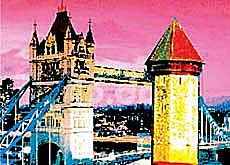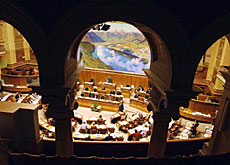British and Swiss share splendid isolation

A new book has highlighted similarities between Britain and Switzerland, tracing the numerous connections between the two countries over the centuries.
The author of “Insular denken” (insular thinking) concludes that chauvinism and money define to some extent the thinking in both countries.
In a series of essays Stefan Howald covers a wide range of issues, from London’s Swiss Cottage, British tourists in the Alps, the reformists John Knox and Jean Calvin, to persistent stereotypes of Swiss cuckoo clocks and a Swedish actress by the name of Ursula Andres.
He notes that both countries share a feeling of self-confidence and take pride in their traditions.
Howald lived in London for more than ten years before he returned to Switzerland in 2003. He works as author, journalist and translator.
swissinfo: You have described Anglo-Swiss ties as an “uncle-nephew” relationship. What exactly do you mean by that?
Stefan Howald: Bluntly put, one partner is vastly superior to the other and that gives an uneven and uneasy relationship. Britain is still an important player on the world stage, while Switzerland is hardly on the map except for its role in the business world.
One of the aims of my book was to show how the relationship changed over the course of history. For instance in the 19th century the relationship was closer than it is today.
swissinfo: You lived in England for about ten years, what similarities did you notice?
S.H.: On a political level it is of course the relationship with the European Union. Supporters and opponents both in Switzerland and Britain use similar language to make their points.
But I also discovered astonishing similarities in attitude towards the end of the 1990s. There was a new wave of patriotism, which manifested itself in the use of symbols such as flags in everyday use: towels with the St George’s Cross, or handbags and shirts with the red and white Swiss flag.
swissinfo: Can you offer any explanation for this simultaneous resurgence of patriotic symbols in Britain and Switzerland?
S.H.: I think it is best described as national insecurity, though on very different levels. Switzerland does not know where it belongs in Europe, and to a certain degree Britain faces the same problem.
It is not sure whether it should seek closer integration with continental Europe, or cooperate with the US, or even revive the old Commonwealth ties.
swissinfo: What’s the fascination of Britain for the Swiss?
S.H.: The fact that Britain is not a neighbouring country helped to create a more benign picture of the country for the Swiss. And Britain has also had lots to offer.
When you go back in history you see the connections, especially the Reformation in the 16th century and political and social developments in the 19th century.
Broadly speaking it appears that both Britain and Switzerland preferred reforms to French-style revolution, a common sense approach that became a national feature.
swissinfo: What was your most surprising finding?
S.H.: Besides discovering the large community of Swiss bakers in London in the second half of the 19th century, the big surprise was to learn that Swiss mercenaries fought for the Crown in the colonies in India and in North America. Swiss officers were apparently teaching the troops to use guerrilla tactics.
swissinfo: Today’s perception of Switzerland in Britain appears to be dominated by stereotypes of cows, chocolate and cuckoo clocks. Is this Anglo-Swiss relationship based on misunderstandings?
S.H.: The British media take a fairly stereotypical view of Switzerland. We have just seen the latest example at the recent European football championships, when a Swiss referee became the target of a campaign by angry English football supporters.
But what is interesting is that the average British person is often not affected by the media hype.
At the height of the controversy in the 1990s over Switzerland’s role during the Second World War, we interviewed people in England. Most of them still thought of Switzerland as the country of mountains, chocolate and clocks.
swissinfo: Summing up your research, you say there is an attitude of “chauvinism armoured with money” both in Britain and Switzerland. Not a very flattering conclusion…
S.H.: It is just one aspect of it. There is a strong element of “we can do it on our own” in both countries. The downside is chauvinism, this thinking that they are the best.
Both countries are still fairly rich, and money plays an important part in both societies too.
On the positive side, you can conclude that Britain and Switzerland have a sense of national pride and are fond of their traditions.
Another conclusion I draw is that both countries could learn from each other. Neither is superior to the other.
swissinfo-interview: Urs Geiser
Stefan Howald, 53, lived and worked in London for ten years as a journalist and translator.
His book “Insular denken” is available in German. An English edition is planned at a later stage.
“Insular denken” traces the connections between Switzerland and Britain.
In a series of essays he covers a wide range of issues, from architecture, religion and politics, to sport and literature in search of an “island mentality”.
Howald says his fascination with England started with music and football.

In compliance with the JTI standards
More: SWI swissinfo.ch certified by the Journalism Trust Initiative



You can find an overview of ongoing debates with our journalists here. Please join us!
If you want to start a conversation about a topic raised in this article or want to report factual errors, email us at english@swissinfo.ch.